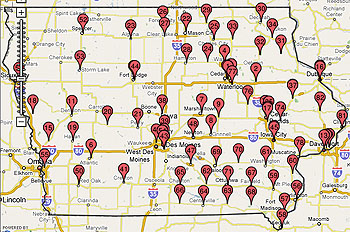Stigma Threatens Reproductive Health Care Access in Rural Iowa
Women living in rural Iowa who need reproductive health care — from contraception to diagnostic tests to abortion — are too often left without access to the services they need.
In rural Iowa, most health care services, including reproductive health
care, are provided by general family practitioners, not by specialists
within specific fields. Because many rural areas have a limited number
of family practices to begin with, both providers and patients have
specific privacy worries and concerns about the public perception of
services offered. Women who need reproductive health care — from
contraception to diagnostic tests to abortion — are too often left
without access to the services they need.
According to the Abortion Access Project,
which tracks access to reproductive health care across the country,
many doctors who could perform certain procedures choose not to because
of potential backlash from local residents who disapprove of abortion
and related health services.
“One of the things we found through our survey project is that many
general practice physicians who otherwise have the skill set to perform
certain procedures such as first trimester aspiration abortion don’t do
so because there is a feeling or a belief that doing so would create
some sort of community backlash,” said Kathleen Lane, who works for the
Abortion Access Project.
While abortion is perhaps the most controversial procedure within
the field of reproductive health care, it is not the only one that is
affected by small-town stigmas. For instance, young people in rural
areas who wish to access birth control may be understandably
uncomfortable talking about it with a doctor who could easily or
inadvertently disclose what was said to parents or other relatives.
There is perhaps even more stigma attached to young people who need
treatments for sexually transmitted infections, which, if left
untreated, can lead to serious health consequences including
infertility.
 Iowa women can currently access completely free long-term birth control at several clinics throughout Iowa. Across the state there are several free or low-cost clinics that provide family planning services.
Iowa women can currently access completely free long-term birth control at several clinics throughout Iowa. Across the state there are several free or low-cost clinics that provide family planning services.
“We know that all access is not created equal,” said Christie
Vilsack, the former first lady of Iowa who is now executive director of
the Iowa Initiative, a research organization that aims to reduce the number of unintended pregnancies across the state.
“One of the reasons the Iowa Initiative exists is that Iowa is 48th
in access to reproductive health care services among the states. We are
a research project that is spending the next 3 to 4 years finishing a
five-year research program, and nearly everything we are doing is about
access — especially access in rural Iowa. One of the reasons we are
48th is because we are a very rural state, and many of our smallest
communities don’t have reproductive health care services available.”
Over the past year, the Iowa Initiative has administered a pilot
program involving satellite clinics, which provide reproductive health
care services to communities that would not otherwise have access to
them. (When feasible, these clinics have been placed within existing
medical facilities, such as hospitals and wellness centers.) The
organization is also starting a test program that provides free
long-term birth control to women. At the end of these test programs,
the Iowa Initiative hopes to provide useful data to organizations
across the country about how to successfully reduce unintended
pregnancies, which cost taxpayers millions of dollars annually and are
the largest factor contributing to elective abortions.
“It’s really important for people to understand that reproductive
health for women is mainstream and no different than any other type of
health care,” Vilsack said. “In many cases — and I think this is
especially true in small towns — there is a perception that these
services are taboo or something controversial when they aren’t at all.
People have babies every day. Most everyone who has been sexually
active has used birth control at one time or another. There’s nothing
taboo about it, it is just a part of health care.”
The Iowa Initiative’s new rural satellite clinics are staffed with
individuals who can provide information on the latest technological
advances in family planning and who can tailor birth control options to
individual needs and circumstances. The Abortion Access Project is
tackling the problem in a slightly different way, working to help
physicians who already practice in rural communities to be better
prepared to meet the needs of women seeking reproductive health
services.
“It’s true that there is a doctor drain
happening in specialized services such as obstetrical care. But when we
think about comprehensive reproductive health care services that
include abortion and STI testing, these are not services that need to
be provided only by specific doctors,” Lane said. “All of this
perfectly fits into the scope of practice of family medicine. Years
ago, before abortion and so much of these became hot-button political
issues, women could go to their regular doctor for these services.
“There’s this whole aspect of continuity of care — of women being
able to go the physician who knows their entire health history,” Lane
said. “That’s the piece that is really missing for both rural and urban
women.”
